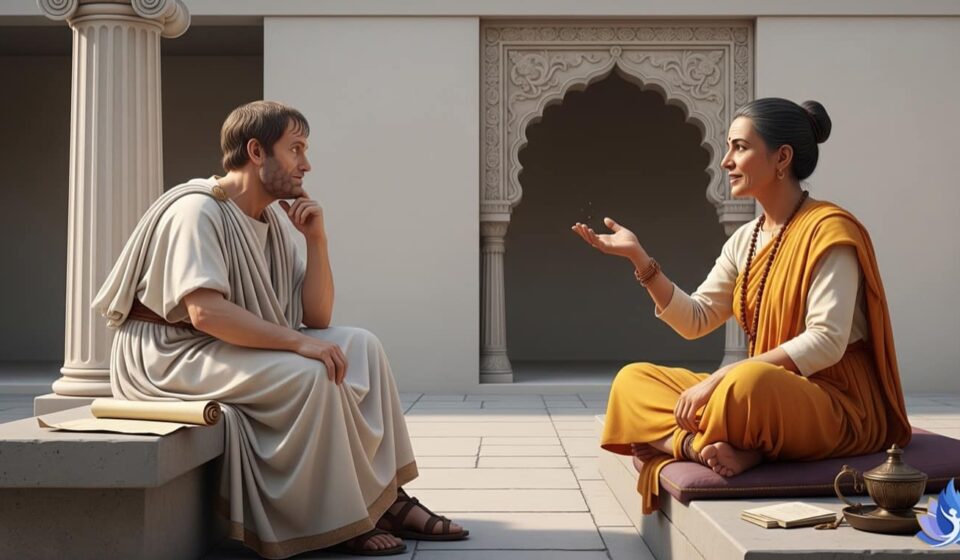
Greek Philosopher vs. Yogini: How Vedic Rishikas Defied Aristotle’s Vision of Women
In a world grappling with gender roles and authority, few contrasts are as profound—or revealing—as that between Aristotle and the Rig Veda. On one hand, the celebrated Greek philosopher classified women as biologically and intellectually inferior. On the other, India’s oldest scripture records dozens of hymns seen by women who were not only respected, but revered. This is not just a cultural contrast—it’s a profound metaphysical divide.
🧠 Aristotle: The Philosopher of Deficiency
Aristotle’s perception of women wasn’t simply a reflection of ancient Greek patriarchy—it was a systematic framework built on biology, metaphysics, and civic theory. In On the Generation of Animals, he argued that:
“The female is… a defective male.”
To Aristotle, man was form, and woman was matter—man provided the creative principle; woman was a passive vessel. Even when acknowledging that women possess reason, he declared it akuron—“without authority.” Whether interpreted as emotionally unstable or politically powerless, the result was the same: women could not rule.
In Politics, he elaborated:
“The male is by nature superior, and the female inferior; the male ruler, the female subject.”
This ideology provided centuries of “rational” justification for female exclusion—not just in Ancient Greece but throughout Western thought.
The Rig Veda: Where Women Were Seers of Truth
Now shift to ancient India. Around 1500 BCE, the Rig Veda—a sacred compilation of hymns—introduced the concept of Rishikas, female seers. These were not just spiritual figures; they were poets, visionaries, and channels of divine revelation (shruti).
Take Vak Ambhrini, who in the Devi Suktam (RV 10.125) proclaims:
“I move with the Rudras and Vasus… I am the breath of the gods, the Queen of all that exists.”
Vak doesn’t pray to the goddess. She is the goddess. In first-person, she identifies herself with Brahman, the ultimate cosmic reality. “Aham Brahmasmi”—“I am the Absolute.”
Other Rishikas like Shachi Paulomi, Apala, Ghosha, and Visvavara breathe life into themes of sovereignty, suffering, ritual power, and personal agency. In RV 10.159, Shachi declares:
“I am the banner; I am the head… My husband follows my will.”
Far from passive subjects, these women conduct rituals, heal their own ailments, and speak with cosmic authority. In fact, the Rig Veda even attributes authorship of hymns to abstract feminine concepts like Vāk (speech) and Śraddhā (faith)—not just to human women.
🧬 Two Visions of Female Authority: Control vs. Revelation
The schism between Aristotle and the Vedic tradition isn’t just cultural—it reflects two philosophical worldviews:
• Aristotelian authority is fixed, hierarchical, and masculine. Women are subordinated by natural law.
• Vedic authority is fluid, spiritual, and inclusive. The seer—regardless of gender—gains status by receiving divine truth.
Aristotle’s model rationalizes exclusion. The Vedas record and preserve the voices of women, some divine, some profoundly human.
🎇 Why This Matters Today
In modern gender discourse, we often seek role models or frameworks that uplift and validate feminine power—not just as equal, but as essential. The Rig Veda is a goldmine of such models. It does not erase women’s pain (as seen in Ghosha or Apala’s personal struggles), but it honors their voice, their insight, and their authority.
Contemporary philosophers and scholars are now revisiting these rich insights. Initiatives like the Oxford Hindu Studies Centre and articles from Oxford Climate Society increasingly cite ancient Indian texts in explorations of ecology, gender, and ethics.
🌺 Final Thought: Seer or Subject—Which Legacy Feels More You?
Aristotle gave us the foundation of logic—but also shackled half of humanity with philosophical chains. The Rig Veda, on the other hand, left us hymns of fire, faith, freedom—and female wisdom.
👉 Which worldview feels more aligned with your idea of true authority? The ruler who defines you, or the seer who sees through boundaries?
If this resonated, share the article with someone exploring ancient wisdom or the roots of gender in philosophy. Let’s bring more Vak into the world.










